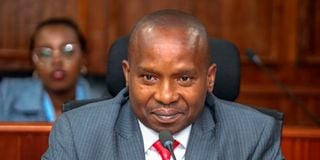Kindiki: Village elders to get stipend as we plan on salary

Interior Cabinet Secretary Kithure Kindiki before the Senate Committee on National Security, Defence and Foreign Relations in Nairobi on Thursday, August 3.
The government is considering paying village elders allowances as it works on a clear compensation structure and a way to absorb them into the national government structure.
Interior Cabinet Secretary Kithure Kindiki said the allowances, without giving an exact figure, will be paid for every meeting attended by the village elders.
Appearing before the Senate committee on National Security and Defence on Thursday August 3, Prof Kindiki said the elders have been assisting assistant chiefs without any form of compensation.
The CS told the committee chaired by Baringo Senator William Cheptumo that there is overwhelming consensus that the village elders should be entrenched in law and get compensated for the work they do.
“We are of the opinion that we start paying them part-time where we instruct assistant chiefs or the heads of units they are working under to pay them allowances for meetings they attend. That will be much more honourable than now where they are paid nothing,” said Prof Kindiki. He pointed out that the elders provide critical services in the security sector.
Mobilising locals
The work of the village elders’ entails mobilising locals for meetings, assisting in identifying criminals, volunteering security information to the police and resolving disputes, among others.
In 2016, then Interior Principal Secretary Karanja Kibicho announced that the government had set aside Sh1.2 billion to pay the elders across the country. He said the ministry had reached out to the Salaries and Remuneration Commission (SRC) for an allowance of Sh1,000 for any meeting attended.
To absorb the village elders into the country’s governance structure, Mr Kindiki told the committee that they are looking at amending the National Government Coordination Act, 2013 to create villages as units of administration, to be headed by elders.
Afterwards, he explained, the government will engage the elders on criteria for recruitment, compensation, functions, termination and disciplinary procedures, among other terms.
“It is the policy position of the government that the role of the village elders is essential and must be entrenched in law,” he said.
The CS said a study is ongoing on the budgetary implication of having the elders as part of the national administration structure with different scenarios already developed on how to accommodate them in the budget.
Prof Kindiki was responding to a push by MPs to have the government pay Sh4.6 billion annually as allowances to the elders.
Through the National Government Coordination (Amendment) Bill, 2023, the lawmakers are considering paying each village elder Sh7,000 monthly as allowances.
The Bill, sponsored by Kibwezi West MP Mwengi Mutuse, seeks to remunerate 45,000 village elders in Kenya’s 9,045 sub-locations, with each unit expected to have five villages. It also wants the elders to receive Sh4,000 monthly as sitting allowance.
Transport allowance
This is in addition to a transport allowance of Sh2,000 per month or Sh500 per week to facilitate attendance of meetings and movement around the village as well as Sh1,000 per month as airtime allowance.
In March, the Budget committee cleared a similar Bill that proposes a Sh3,000 monthly allowance for village elders across the country. The National Government Coordination (Amendment) Bill, sponsored by Malava MP Malulu Injendi seeks to recognise the elders as administrative officers of the national government.





